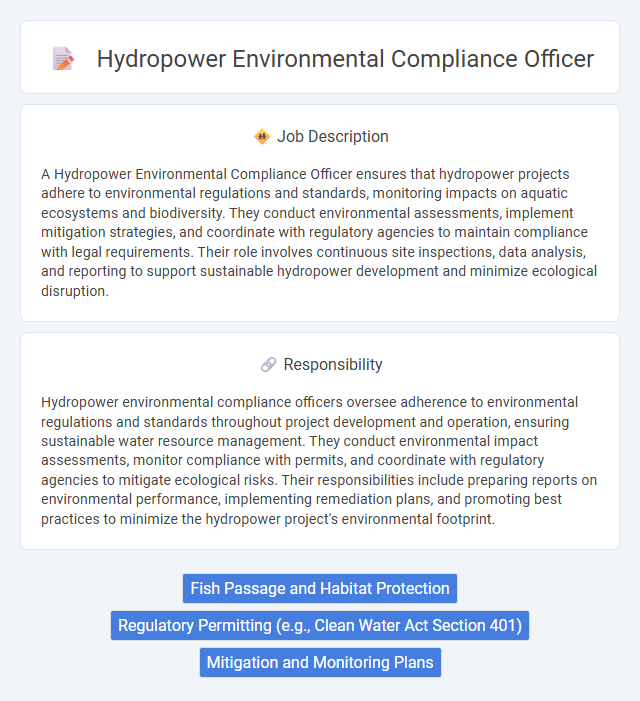
A Hydropower Environmental Compliance Officer ensures that hydropower projects adhere to environmental regulations and standards, monitoring impacts on aquatic ecosystems and biodiversity. They conduct environmental assessments, implement mitigation strategies, and coordinate with regulatory agencies to maintain compliance with legal requirements. Their role involves continuous site inspections, data analysis, and reporting to support sustainable hydropower development and minimize ecological disruption.
Candidates with a strong understanding of environmental regulations and a passion for sustainable energy are likely suitable for the role of Hydropower Environmental Compliance Officer. Individuals comfortable working outdoors, analyzing environmental data, and interacting with diverse stakeholders would probably excel in this position. Those who prefer structured tasks and have good problem-solving skills tend to fit well within the regulatory frameworks required for hydropower projects.
Qualification
A Hydropower Environmental Compliance Officer must possess a bachelor's degree in environmental science, engineering, or a related field, complemented by expertise in environmental regulations specific to hydropower projects. Proficiency in environmental impact assessments, water quality monitoring, and habitat conservation is essential to ensure compliance with federal and state laws. Experience with environmental management systems (EMS) and certifications such as ISO 14001 or NEBOSH enhance the ability to manage regulatory reporting and mitigate ecological risks effectively.
Responsibility
Hydropower environmental compliance officers oversee adherence to environmental regulations and standards throughout project development and operation, ensuring sustainable water resource management. They conduct environmental impact assessments, monitor compliance with permits, and coordinate with regulatory agencies to mitigate ecological risks. Their responsibilities include preparing reports on environmental performance, implementing remediation plans, and promoting best practices to minimize the hydropower project's environmental footprint.
Benefit
The role of a Hydropower Environmental Compliance Officer likely enhances sustainability by ensuring projects adhere to environmental regulations, reducing ecological impact. This position may improve community relations through transparent monitoring and reporting, promoting a positive company image. Furthermore, it probably supports risk management by preventing legal penalties and operational delays linked to non-compliance.
Challenge
Challenges faced by a Hydropower Environmental Compliance Officer likely involve navigating complex regulatory frameworks to ensure project adherence while minimizing ecological impact. The role probably demands careful monitoring of water quality, wildlife habitats, and sediment control, which can be difficult due to variable environmental conditions. There is also a high probability of needing to coordinate with multiple stakeholders to address compliance issues and mitigate potential environmental risks.
Career Advancement
Hydropower Environmental Compliance Officers play a critical role in ensuring that renewable energy projects meet stringent environmental regulations, minimizing ecological impact and promoting sustainable energy practices. Career advancement in this field often involves gaining specialized certifications, such as Certified Environmental Professional (CEP), and developing expertise in regulatory frameworks like the Clean Water Act and Endangered Species Act. Professionals can progress to senior roles such as Environmental Compliance Manager or Sustainability Director, overseeing larger projects and influencing corporate environmental strategy.
Key Terms
Fish Passage and Habitat Protection
A Hydropower Environmental Compliance Officer specializing in Fish Passage and Habitat Protection ensures that hydroelectric projects meet regulatory requirements to safeguard aquatic ecosystems. This role involves monitoring fish migration patterns, implementing mitigation measures like fish ladders or bypass systems, and coordinating with environmental agencies to protect habitat quality. Expertise in environmental law, aquatic biology, and project impact assessment is essential to minimize ecological disruption and promote sustainable hydropower operations.
Regulatory Permitting (e.g., Clean Water Act Section 401)
Hydropower Environmental Compliance Officers ensure adherence to regulatory permitting requirements, including Clean Water Act Section 401 certifications that address water quality standards for project operations. They collaborate with federal and state agencies to secure permits and monitor ongoing compliance to mitigate environmental impacts such as water pollution and habitat disruption. Expertise in environmental law, water resource management, and environmental impact assessments is essential for effective permitting and regulatory negotiations in hydropower projects.
Mitigation and Monitoring Plans
Hydropower environmental compliance officers develop and implement Mitigation and Monitoring Plans to minimize ecological impact and ensure adherence to environmental regulations. These plans typically include strategies for habitat restoration, water quality protection, and continuous monitoring of aquatic and terrestrial ecosystems affected by hydropower operations. Effective compliance supports sustainable energy production while safeguarding biodiversity and promoting regulatory compliance with agencies such as the EPA and FERC.
 kuljobs.com
kuljobs.com